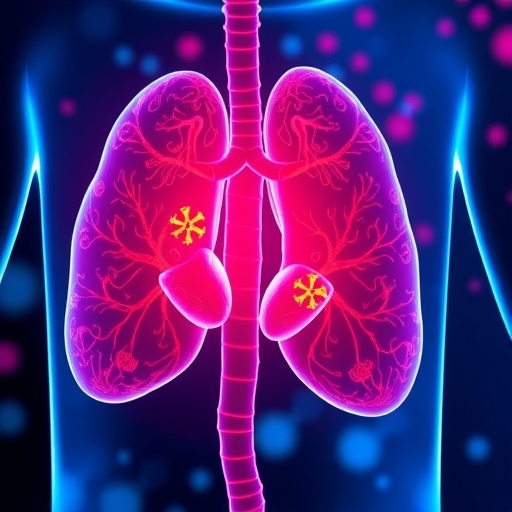Non-muscle invasive bladder cancer (NMIBC) remains a formidable challenge in oncology, largely due to the limitations of current diagnostic tools. Despite advances in medical science, early detection and accurate grading of NMIBC continue to suffer from insufficient sensitivity and specificity among available biomarkers. This gap has driven researchers to investigate new avenues, and lipidomics—the comprehensive analysis of lipids within biological systems—has emerged as a promising frontier. A groundbreaking study using plasma lipid profiling proposes a transformative step forward in biomarker identification for NMIBC, potentially revolutionizing the clinical management of this common yet complex malignancy.
Bladder cancer ranks among the most frequently diagnosed cancers worldwide, with NMIBC representing a significant subset of cases characterized by tumor confinement to the bladder’s inner lining without muscle invasion. Conventional cystoscopic examination and urine cytology, though standard, are invasive, expensive, and sometimes inconclusive, especially for low-grade lesions. Hence, the quest for minimally invasive, reliable biomarkers is imperative. Lipids, known for their crucial roles in cellular signaling, membrane structure, and energy homeostasis, have recently been implicated in cancer pathogenesis, opening the door for lipid-based diagnostic strategies.
The recent study harnessed the sophisticated technique of liquid chromatography coupled with high-resolution mass spectrometry (LC-HRMS) to profile plasma lipid metabolites in a cohort of 214 individuals, including 106 NMIBC patients and 108 healthy controls. This technology enables unprecedented resolution and sensitivity in detecting subtle metabolic alterations associated with malignant transformation. By comparing lipidomes between groups, the researchers sought to decipher distinct biochemical signatures indicative of NMIBC presence and progression.
Findings revealed a pronounced disparity in plasma lipid profiles between NMIBC patients and healthy adults, underscoring the metabolic perturbations induced by bladder carcinogenesis. Notably, metabolites such as hydroxy fatty acids, O-linked triacylglycerols (O-TAG), O-linked lysophosphatidylglycerols (O-LPG), and various hydrocarbons were substantially enriched in the NMIBC group. These alterations suggest a profound remodeling of lipid metabolism in cancer cells, possibly reflecting adaptive mechanisms to support rapid proliferation and survival in the tumor microenvironment.
To translate these lipidomic insights into clinical practice, the authors developed predictive models leveraging select lipid panels. One such panel comprising phosphatidylethanolamines PE(14:1/20:0) and PE(18:2/16:0), alongside 19-methyl-heneicosanoic acid, demonstrated robust discriminatory power between NMIBC patients and controls. The model achieved an area under the curve (AUC) of 0.88 in training datasets, and maintained impressive validation performance with an AUC of 0.82. This level of accuracy rivals or surpasses many existing diagnostic modalities, signaling a potential paradigm shift.
Importantly, the model’s diagnostic capability extended effectively to low-grade NMIBC cases, which typically pose greater diagnostic ambiguity. An AUC of 0.81 for this subgroup highlights the panel’s sensitivity in detecting early-stage malignancies, a crucial factor for enabling timely interventions and improving patient prognoses. Additionally, the study explored grading differentiation by constructing a separate lipid panel capable of distinguishing between low- and high-grade NMIBC. This classifier attained an AUC of 0.815, with consistent cross-validation results, affirming its reproducibility and clinical utility.
These revelations support the notion that perturbations in lipid metabolism are not merely epiphenomena but contributory factors in bladder cancer pathophysiology. Lipid alterations may influence membrane fluidity, oxidative stress responses, and oncogenic signaling pathways. Thus, profiling these molecules offers dual benefits: serving as biomarkers for non-invasive diagnosis and providing insights into tumor biology that may guide therapeutic innovations.
Moreover, the use of plasma as a biofluid for lipidomic analysis highlights the feasibility of routine clinical application. Blood samples are relatively easy to obtain and process compared to invasive tissue biopsies, enhancing patient compliance and enabling longitudinal monitoring. Such monitoring could be vital for surveillance post-treatment, detecting recurrences early, and tailoring personalized management strategies based on lipidomic profiles.
The methodological rigor of the study, incorporating 10-fold cross-validation and leave-one-out validation techniques, strengthens the reliability of the results. These statistical approaches mitigate overfitting and affirm the generalizability of lipid biomarker panels across diverse patient populations. As the field advances, further large-scale multi-center studies will be essential to confirm these findings and optimize lipid panels for different demographic groups.
Integrating lipidomic data with other omics platforms, such as genomics and proteomics, could also amplify diagnostic precision and elucidate complex molecular interactions underpinning NMIBC. Systems biology approaches harnessing multi-modal data can enhance biomarker discovery and ultimately foster the development of targeted therapies aimed at lipid metabolism pathways disrupted in bladder cancer.
The study’s implications extend beyond NMIBC, suggesting that plasma lipidomics might be applicable to other urological malignancies and solid tumors where metabolic dysregulation is evident. Broadening this research may uncover universal or cancer-specific lipid signatures, paving the way for universal screening tools or tumor-type tailored diagnostics.
In conclusion, this pioneering research spotlights plasma lipidomics as a formidable approach to identify novel biomarkers capable of diagnosing and grading non-muscle invasive bladder cancer with high accuracy. The identified lipid profiles not only reflect disease presence but correlate with tumor aggressiveness, underscoring their value for early detection and clinical decision-making. As the medical community continues to grapple with the complexities of bladder cancer, lipid metabolite panels represent a promising leap toward more effective, non-invasive, and precise diagnostics fit for the demands of modern oncological practice.
Subject of Research: Non-muscle invasive bladder cancer (NMIBC) diagnosis and grading using plasma lipidomics.
Article Title: Plasma lipidomics for biomarker identification in non-muscle invasive bladder cancer.
Article References:
Zhao, Y., Ji, Z., Sun, W. et al. Plasma lipidomics for biomarker identification in non-muscle invasive bladder cancer. BMC Cancer 25, 1702 (2025). https://doi.org/10.1186/s12885-025-15019-6
Image Credits: Scienmag.com
DOI: 10.1186/s12885-025-15019-6




